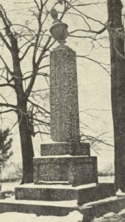
It was in the spring of 1884 that Eugene A. Mead, 1887, who may be considered the father of Lambda Deuteron, conceived the idea of forming an organization to petition a national fraternity for a charter. His first associate was Albert V. Gear, 1887, later one of the founders of Delta Xi Chapter at Berkeley.
(On left) Jonathan Going's Tomb: Here success was pledged.
They met, to make their plans, under the cover of night in the old college cemetery on the campus high point, whence comes the special significance to the Denison Chapter, of its coat-of-arms, for it was at the monument of Jonathan Going, a former president of the University, that these two secretive sophomores pledged themselves to the success of the project that has developed into one of the Fraternity's stalwart chapters.
THIRD CHAPTER ON CAMPUS
Chapters of Sigma Chi and Beta Theta Pi had both been established at Denison in 1868 and were in a flourishing condition at the time Mead and Gear launched their enterprise. Some years previously they had carried on sub rosa for a time because of university anti-fraternity rules but those rules had been repealed in 1881 and fraternity spirit again ran high.
Organizations were formed and efforts made to obtain charters from both Delta Upsilon and Alpha Delta Phi but both of the attempts failed, a fact that inspired caustic comment in the Denison Collegian. There was no connection, however, between these movements and the one that resulted in the founding of Lambda Deuteron.
Such was the state of affairs when "Gene" Mead and "Alphonso" Gear, and several other students who had joined them, took the first steps toward obtaining a charter from some national fraternity. What followed is succinctly stated in "The Story of Lambda Deuteron," an article by Milo B. Price, 1892, which appeared in the October, 1891 number of The Phi Gamma Delta.
Negotiations were first tried with an Eastern fraternity, but this enterprise signally failed. Not at all discouraged but rather spurred to renewed effort by this apparent ill luck, Brother Mead opened communications with members of both Omicron Deuteron and Theta Deuteron Chapters of Phi Gamma Delta, some of whose members were his acquaintances. In the meantime two more had been invited to join the ranks, swelling the whole number to eight. Brother Mead's efforts finally resulted in interesting the members of Omicron Deuteron and Theta Deuteron and better acquaintance was sought between them and the prospective chapter at Denison.
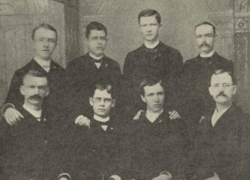 The Founders of Lambda Deuteron Chapter.
The Founders of Lambda Deuteron Chapter.
Top row: Charles Thompson Atwell, John Sinsel, August Frederic Foerste, Samuel Edward Davies
Bottom row: Eugene Adelbert. Mead, Albert Van Clief Gear, Enoch Jones Price, Perry Wilson Longfellow.
After long and patient waiting early in 1885, a petition for a charter was brought before the Grand Chapter but for some reason or other was rejected. Naturally this was not conducive to enthusiasm in the cause, but the fraternal spirit which existed among the boys became an incentive to another trial for a charter. With the help of neighboring chapters a list of exceptions was filed to the first petition, and a second one brought before the G. C. for consideration and this time successfully.
On March 18, 1885, two brothers from Theta Deuteron came to Denison and installed the chapter in the Odd Fellows hall, which was kindly loaned for the occasion. Lambda Deuteron's charter bears date the 8th day of February, 1885, and the names of the founders forever inscribed in the records of the Fraternity and in the hearts of all worthy Fiji sons of Denison (see above).
CAMPBELL WAS LEGATE
Thomas Huffman Campbell (Ohio Wesleyan '85) was the Legate who installed the new chapter. The Granville Times, in its issue of March 20, 1885, described the advent of another fraternity on the. Denison campus in these words: "'The New Frat.' [sic!], as it has long been styled by the students, showed their colors last Thursday morning, sporting the pins of Phi Gamma Delta."
What manner of men were these founders? Space does not permit an account worthy of our debt to them but, even so, the mere listing of their names hardly suffices.
- When the boys wanted good advice and sound judgment they looked especially to Atwell. "Hans" became a banker and one of our most interested and loyal alumni.
- Davies, very likable, was the oldest of "the immortals" and already an ordained preacher. He is now a retired Baptist clergyman.
- "Old" Foerste, listed in Who"s Who in America as a paleontologist, was, even in his student days, famed in science. For several years he served the fraternity as Section Chief in the New England area.
- "Alfonso" Gear was an outstanding student and had the unusual distinction of having been a founder of two chapters of the Fraternity: Denison and California at Berkeley.
- Longfellow won renown as an orator and "recited," with great effect, "Darius Green and His Flying Machine." In later life, he was a Baptist minister.
- Mead was a member of Denison's first glee club and an accomplished pianist. It was "Gene" who had the self-imposed task of looking after the first chapter hall.
- Price, later a successful lawyer in Chicago, is a member of the Phi Beta Kappa, as is Foerste. "The Welshman," as he was called in Granville, later became affiliated with the Michigan Chapter and has four Fiji sons all of whom are Denison graduates, the eldest, Allen T., 1916, being the first member of the chapter whose father was a Denison graduate and a Fiji.
- "Jack" Sinsel was a social lion and became an important figure in the U.S. Internal Revenue Service.
A JEFFERSON IMPRESS
The Rev. Dwight B. Hervey (Jefferson 1858), then the president of the Granville Female Seminary, a Presbyterian institution, was their good friend. A graduate of this college, Elizabeth Crosby, married, in 1852, one of the founders of the Fraternity, Naaman Fletcher (Jefferson 1849). We learn from the history of our order that "Fletcher carried the spirit of the 'Delta Association' into the seat of Denison many years before Lambda Deuteron was established, and had it not been for the prohibition of fraternities, the Denison Chapter might today be one of the oldest of Phi Gamma Delta."
At the time of the founding of Lambda Deuteron, Denison University was not, as now, coeducational, and consisted of two departments, college and preparatory. A large proportion of our earlier members attended both, making a seven-years' course in all, a fact that explains the initiation of many "senior preps" before they had attained even the rank of freshmen. It was not until October 21, 1897, that the chapter "resolved" that "preps be initiated in the fall term of the freshman year instead of in the spring term of the senior academy year."
Fraternity chapters were small in those days, at least at Denison, and so continued for many years. For example, it was reported in the fall of 1887 that we then had 14 active members; the Betas, 10; and the Sigs, 10. Quite a contrast to the 1930s when, on the same campus, these fraternities had chapters of around 50 active members! In the late fall of 1899, Lambda Deuteron, with 16 "actives" and 1 pledge, was the largest of the seven chapters of Phule VIII!
From the first the Denison Chapter of Phi Gamma Delta was a strong one. The records show abundant evidence of outstanding leadership in the classroom and in all outside activities.
In those early days oratorical contests were more important than intercollegiate athletics. Though Charles H. Bosler, 1890, won renown as a baseball pitcher on Denison's championship teams, his greatest achievement was then considered to be winning the local oratorical contest in his sophomore year and the state contest also. John A. Chamberlain, 1899, performed a like feat when a senior.
We were well represented in athletics, also. Brother Bosler had a brilliant record as pitcher for championship Denison teams. Both he and F. W. Withoft, 1894, an all-round athlete, served as presidents of the Ohio Intercollegiate Athletic Association.
In 1892 it was reported that we had five men on the football team including the captain and manager and that "Denison leads Ohio colleges in baseball and general athletics." "Dan" Daub, 1897, was extraordinarily effective on the mound and thereafter pitched for two major league clubs. In one season he averaged 16 strikeouts per game for Denison. In 1893 Denison won 15 out of 17 games. "AI" Withoft (Denison 1897, Ohio State 1897) was a good hitter and played sensationally at second and short for both Denison and Ohio State. He declined an offer to play professional ball.
ALWAYS MUSICAL CHAPTER
Lambda Deuteron was soon officially recognized as a musical chapter. At the 42nd Convention, held in 1890, the Denison Fijis were authorized to collect material for a revision of the first edition of The Songs of Phi Gamma Delta, published in 1886, and undertook the task with great zeal. But they later found that the editor of the first edition, Walter C. Stier (Lafayette 1884 ), would not permit the use of the songs in that collection and, therefore, with the consent of the next convention, turned their material over to him.
However, having wooed the Muse, they decided to get out a song-book anyway, and published at their own expense "The Songs of Denison", a book of 88 pages then described in The Phi Gamma Delta as "the only work of the kind among the Ohio colleges." The editors were William F. Chamberlin, 1893; Orlo J. Price, 1894, and O. H. Rask, 1894.
One of the chapter assets in the early days was the horse and gig owned by O. H. Larwill, 1891. It was most useful during the rushing season: every "prospect" was taken for a ride and with uniformly good results. The brothers of the period, having no house, lived in the college dormitories and in private homes in the town. So-called eating clubs were run by members.
In the beginning the local chapters of Beta Theta Pi and Sigma Chi were openly hostile toward the movement that culminated in the chartering of a chapter of Phi Gamma Delta at Denison. That attitude continued for a time after Lambda Deuteron was established but was of short duration.
One sharp line of cleavage persisted, however; and that was the arbitrary one of membership in the two literary societies. The Betas and the Sigs belonged to Franklin, while the Phi Gams joined Calliope. In those days the literary societies were outstanding in extra-curricular activities and vital factors in class politics, and the friendly rivalry between the two old fraternities on the one side and the new one on the other was thereby much intensified.
In looking back at our pioneers it is interesting to find in the pages of the magazine of the fraternity a contemporary description of the actives of that period. An account of the 24th General Convention held September 26-28, 1888, at Columbus, 0hio, includes the following: "Lambda Deuteron came over en masse, while the Wooster and Springfield chapters turned out almost as strong. All good fellows and men - men whom any Delta would be glad to welcome into his own chapter; typical Deltas, sturdy, intellectual, well-rounded gentlemen."
In view of the extent to which coeducation now prevails it is amusing to learn of the experience of the member of the fair sex who first sought to overcome the prejudice against it at Denison. She was Grace Gertrude Lyon who became the wife of Charles L. Seasholes, 1889, and the mother of H. Craig Seasholes, 1922. The story is told in a chapter letter thus:
This year's class [1889] consisted of 11 members, six of whom were fraternity men; only 10 of these however received degrees, the 11th had the misfortune (?) to be a lady and, as the trustees of Denison are opposed on principle to co-education, they could (?) give her only "a certificate of credit" for her four years of hard work.
Miss Lyon was a brilliant student and in her college days was known as a staunch friend of Lambda Deuteron. Which reminds us that a poem entitled "Phi Gamma Delta" by Mabel Clare Swartz, published in The Phi Gamma Delta for April, 1890, is, we believe, the first original contribution from a woman's pen to appear in the magazine of the fraternity. The author was the wife of F. W. Withoft, 1894.
FIRST HOME ACQUIRED
The first home of Lambda Deuteron was in the O. C. Jones Block which stands at the north-east corner of Broadway and Prospect Street. The relations between landlord and tenant appear to have been pleasant enough and June 5, 1895, a lease from Mr. Jones for a term of five years was authorized. However, on February 7th following, it was decided to move to the rooms over "Jerry" Ackley's drug store in the Frank Robinson Block.
The first meeting in the new quarters - being the premises now known as 130 East Broadway - was held April 10, 1896. These rooms had lately been tenanted by the Betas who had vacated to occupy a chapter house of their own. Here the chapter had its headquarters until the acquisition of the S. S. Chamberlin Lodge six years later.
These early homes of Lambda Deuteron were invariably referred to as "the chapter hall" and served not only as a place for regular meetings and for "hours of ease" but, also, as the scene for most of the chapter parties, receptions and banquets.
There were many functions to which were invited young ladies of the town and of the upper and lower sems - the two female seminaries then in the village being so distinguished in local parlance. Stag affairs, the more informal of which appear to have been known as "bums," were numerous also. The matter of menus had due attention then as now: we find, for example, that in November, 1899, the chapter formally accepted the offer of Mrs. Mitchell, a local cateress, to furnish for $10 oysters on the half-shell and quail on toast for a banquet.
One of the most significant functions held in this early period was the banquet March 16, 1895, celebrating the tenth anniversary of the chapter. E. P. Childs, 1894, was the only alumnus on the toast list. It was then reported that Lambda Deuteron had 66 members, all living.
Since Lambda Deuteron has had chapter-house, both undergraduates and graduates have been accustomed to walking in and out through the front door without let or hindrance. But it was not thus during the days of the chapter halls. Then the door was locked and each active member had a key. The records show that one of the main problems of those in authority was limiting access to the premises to those considered entitled thereto. When a member ceased to be an undergraduate he was expected to turn in his key and the replacement of the lock was almost an annual affair.
Conveniences in the old halls were, of course, not up to the standards of the present day. But they were not altogether lacking: December 14, 1899, the Committee On Hall Improvement, reported that "a spit box had been obtained and placed in the hall." A few days before, the chapter had authorized the appointment of a committee to find and buy a house which may explain the fact that at the same meeting a motion that gas-burning appliances be installed in the heating stove was lost.
The brethren of the late 1890s, like all active chapters, were of varying temperaments. Some were a lively lot, as evidenced by the contemporary records. Others were more sedate. On October 13, 1898, it was resolved that a fine of 25 cents be imposed on each member found guilty of playing cards or smoking in the chapter hall. It was soon found necessary to modify this rule for special occasions and not long thereafter it was rescinded. On November 28, 1899, a levy of 30 cents per member was voted "to buy six hymn books for use in church."
THE GEORGE STREET EPISODE
George T. Street, 1900, was the hero of an expensive episode of the period. The quarters and fixtures of the Shepardson literary society had been destroyed by fire and to help restore the young ladies to their former estate, someone gave them a Scotch collie pup to sell. He was offered at public venue and the rivalry among the three fraternities being most intense, the bidding was fast and furious until it reached the dizzy height of $175 at which price the dog was sold to Street. He became the property of the chapter and was promptly dubbed "Fiji."
It was about this time that John R. Tucker, 1901, succeeded in being twice initiated into the fraternity. On May 25, 1897, when a senior prep [preparatory student], he was initiated, under the name of John Randolph Tucker (Randolph being a family name) by Lambda Deuteron. Sometime thereafter he matriculated at Washington and Jefferson and evidently kept the fact of his membership in the fraternity a secret because he was soon initiated by the chapter there and under his real name, John Ralph Tucker. He thus had two certificates of membership and we are told by a close relative that he had them both framed and hung on the wall at home over his bed, considering them a unique possession.
Financing the football team appears to have been a more direct problem, for we find that a committee of the chapter was appointed January 4, 1900, to join with a Sig committee in an investigation into the use of funds contributed to the team. A week later they reported everything satisfactory.
Until 1911 Beta Theta Pi, Sigma Chi and Phi Gamma Delta continued to be the only national fraternities represented on the campus. In that year Beta Alpha Delta, a local organized in 1902-03, obtained a charter from Kappa Sigma. In the course of time our rivals had procured houses and it became necessary for us to get like accommodations to meet the competition for new men. Efforts were made to find a suitable house in the summer of 1899 and thereafter but they were unsuccessful.
THE DAYTON MEETING
Subsequent events were well set out by William F. Chamberlin, 1893, in The Phi Gamma Delta for May, 1902. In the latter part of February of that year, Section Chief Stuart Eagleson (Wooster 1891) held a conference in Dayton with graduates of the chapter, where its needs were fully considered. It was proposed that a stock company be formed that should acquire property and hold it in trust for the fraternity. Eagleson and Chamberlin immediately visited Granville and placed before the chapter the plans formulated in Dayton.
February 28, Charles K.. Chapman, 1902, met the following graduates at the Chittenden Hotel in Columbus: Charles H. Bosler, 1890 ; Clark W. Chamberlain, 1894; William F. Chamberlin, 1893; Clark B. Hatch, 1900, and Charles W. Montgomery, 1900.
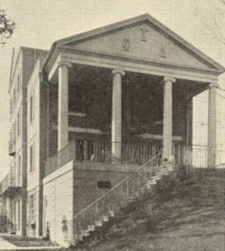 The Old Denison Chapter House on Granville's Broadway. Said Senator Ingalls: "This is, indeed, a temple of Greece!"
The Old Denison Chapter House on Granville's Broadway. Said Senator Ingalls: "This is, indeed, a temple of Greece!"
At that meeting "Billy" Chamberlin presented a proposition from the family of the late Samuel Scovel Chamberlin, 1896, to the effect that if the company to be organized should be named for S. S. Chamberlin and if the property to be purchased should be also named for him, they would take $1,500 of the stock. The offer was gratefully accepted and the S. S. Chamberlin Association of Phi Gamma Delta was duly incorporated under the laws of the State of Ohio with an authorized capital stock of $10,000.
According to instructions, the secretary of the association, "Billy" Chamberlin, visited Granville on March 6 and obtained an option to buy the E. M. Downer property on East Broadway for $6,000. The house and grounds were considered the most attractive in the village. Senator Ingalls, stopping before it, exclaimed, "This is, indeed, a temple of Greece!" William McKinley, passing by in the course of a visit to Granville in 1892, said, "How I should like to live in that fine old mansion!" Dr. E. W. Hunt, when president of Denison, called it "an ideal fraternity home."
The option extended only to April 15 so the campaign for subscriptions and funds was short and energetic. The one hundred graduates of Lambda Deuteron were scattered and the addresses of many were not known. On the night of April 14, the telegraph operator in the sleepy old college town had some business, and the historic day for Phi Gamma Delta at Denison came with the purchase price all subscribed and all conditional gifts therefore assured. At noon on April 15 the secretary of the association presented himself before the grantors of the option and tendered the purchase price in gold certificates and legal tender. The deed was duly executed and delivered and the flags wound around the Doric columns announced to the college world the acquisition of a new home for Phi Gamma Delta.
Lambda Deuteron thus became one of the twelve chapters of the Fraternity then owning a house.
CHAPTER GUARDS CASH
Our secretary had not known that the option called for legal tender but, in the nick of time, was so advised by a well-wisher. Accordingly, "Billy" came to Granville loaded down with coin of the realm or its equivalent and members of the active chapter stayed up all night in the chapter hall to guard the money.
Exercises dedicating "the new house" were held on June 10, 1902, during commencement week, and were attended by a large and distinguished company, including the president of the university. The occasion was the first official recognition of fraternities at Denison.
Installed in the new home, the active chapter entered on an era of effectiveness and success that continues to the present day. "May their shadow never grow less!" That having a chapter house was an incentive appears from the record of a meeting on November 21, 1902, when there was accepted the report of a "Committee on the Deportment, General Dress and Demeanor of Members of the Active Chapter."
It was thought that the house on Broadway would continue to be the abode of the chapter until some remote time in the dim future; but this is a changing world and in less than three decades the old halls knew them no more.
MOVE TO GREEK ROW
The S. S. Chamberlin Lodge was the home of Lambda Deuteron for 28 years until, in the early fall of 1930, the chapter moved to the new house on the hill. For this change Clark W. Chamberlain, 1894, was largely responsible because it was while he was president of Denison that he suggested and urged a Fraternity Row on the campus as a part of the building and expansion program that he so successfully carried out.
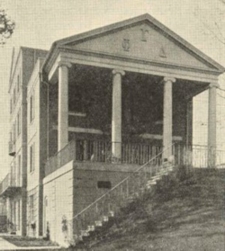 (On left) An Old Landmark: The Grecian elements of the old house down in the village have been preserved in the architecture of the east porch of Lambda Deuteron's present lodge. The porch overlooks the athletic stadium.
(On left) An Old Landmark: The Grecian elements of the old house down in the village have been preserved in the architecture of the east porch of Lambda Deuteron's present lodge. The porch overlooks the athletic stadium.
The members of Lambda Deuteron were loath to leave the old house, with its traditions and memories, even to keep up with the procession. Submission to the inevitable was a slow process but, after many meetings over a long period, was finally arrived at. Again it was realized, and with reason, that youth must be served. For in the perennial competition for new men the chapter would be at a great disadvantage in the old location.
The new house was dedicated with appropriate ceremonies October 18 and 19, 1930. The President of the Fraternity and other national officers participated in the program. The new edifice was of fireproof construction and in its plan and arrangement ideal for fraternity house purposes. The lion's share of the credit for the vision and hard work that it represents goes to Clarence L. Fox, 1915, president of the S. S. Chamberlin Association at the time. Doubt was resolved into certainty and the house built.
The first chapter house went to Kappa Sigma for a number of years. It is now a museum.
Many of our earlier members took an active part in the annual conventions and held various offices during the sessions. These brethren included: A. F. Foerste, 1887; John Sinsel, 1888, C. H. Bosler, 1890; E. B. Kinney, 1892; W. F. Chamberlin, 1893; C. E. Barker, 1894; E. P. Childs, 1894; F. W. Withoft, 1894; and O. H. Rask, 1894. Charles H. Bosler, 1890, and W. F. Chamberlin, 1893, served as Lay Archons. Of Section Chiefs we have contributed eight: A. F. Foerste, 1887, who installed the M. I. T. Chapter; C. H. Bosler, 1890; W. F. Chamberlin, 1893; O. H. Rask, '94; L. J. Fox, 1906; T. S. Johnson, 1908; R.. H. Morrow, 1914, and J. E. F. Wood, 1924.
ABOUT BILLY CHAMBERLIN
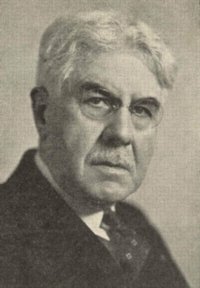 An account of the doings of Lambda Deuteron calls for many merited mentions of William F. Chamberlin, 1893. "Billy" was elected president of the 49th Annual Convention held in 1897 at the State Capitol in Nashville, Tennessee, and, August 5, 1910, at the 62nd Ekklesia held at Niagara Falls, Canada, he was elected President of the Fraternity. In The Phi Gamma Delta for November, 1910, appeared this tribute: "The elevation of William F. Chamberlin to the presidency of the fraternity was a merited recognition of years of unselfish and unremitting labor for the fraternity, while the enthusiasm with which the honor was bestowed spoke volumes for the personal popularity of the man."
An account of the doings of Lambda Deuteron calls for many merited mentions of William F. Chamberlin, 1893. "Billy" was elected president of the 49th Annual Convention held in 1897 at the State Capitol in Nashville, Tennessee, and, August 5, 1910, at the 62nd Ekklesia held at Niagara Falls, Canada, he was elected President of the Fraternity. In The Phi Gamma Delta for November, 1910, appeared this tribute: "The elevation of William F. Chamberlin to the presidency of the fraternity was a merited recognition of years of unselfish and unremitting labor for the fraternity, while the enthusiasm with which the honor was bestowed spoke volumes for the personal popularity of the man."
In "The Lambda Deuteron Fiji" of the same date was featured an expression of praise and appreciation of the new President and his services to the fraternity and the chapter.
In 1911, at the 63rd Ekklesia in Pittsburgh, "Billy" was elected Historian and became, as Editor [Cecil J. "Scoop"] Wilkinson would phrase it, "the superb historiographer of our noble order." He wrote a history of the Fraternity in two volumes, Tomos Alpha (1921), "The Beginnings," and Tomos Beta (1926), "The Superstructure". The first volume was reprinted as the October, 1934, number of The Phi Gamma Delta and includes an amendment of the original prolegomena written by the author at Granville on August 11, 1934, while attending Lambda Deuteron's annual mid-summer pilgrimage.
THE FIRST PIG DINNER
Lambda Deuteron's first pig dinner was held January 25, 1904. It was given in honor of Dr. Wilmer F. Christian (Wabash 1892), Treasurer of the fraternity, and was attended by about fifty fraters. Among those present were M. R. Montgomery, 1906, and A. B. Jones, 1907, who have attended all of the chapter's 32 pig feasts. In a paper on "Pig Dinner Songs" in The Phe Gamma Delta for February, 1905, William F. Chamberlin, 1893, first suggested that this function be called the Norris Dinner. And so it is, even unto the present day.
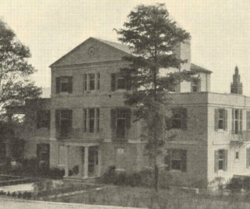 North Elevation of Denison's Home. Reminiscent of many English residential and society halls of the 18th century, the home of Lambda Deuteron Chapter is a gem in the hilltop crown known as Fraternity Row. To the left may be seen one of the dormitory buildings of the university, while to the right, above one corner of the house is visible the lofty tower of the chapel, from whose carillon peal forth on occasion Phi Gamma Delta songs written by Denison men.
North Elevation of Denison's Home. Reminiscent of many English residential and society halls of the 18th century, the home of Lambda Deuteron Chapter is a gem in the hilltop crown known as Fraternity Row. To the left may be seen one of the dormitory buildings of the university, while to the right, above one corner of the house is visible the lofty tower of the chapel, from whose carillon peal forth on occasion Phi Gamma Delta songs written by Denison men.
Phi Gamma Delta has long had a national magazine without a superior in the fraternity field. It will not, therefore, be amiss to quote from a Denison chapter-letter in The Phi Gamma Delta for April, 1887: "We are delighted to see the tardiness of our Quarterly reduced from three months to six weeks. Let the good work go on until our rivals shall have no reason to call our journal 'the latest thing out.' "
Back in 1912 The Phi Gamma Delta said of Leonard J. Fox, 1906, that he was "one of the most enthusiastic and dependable of the alumni boosters who helped the magazine get 2,200 new alumni subscribers."
At a chapter meeting March 12, 1903, a committee was appointed to investigate the cost of having a graduate circular letter printed. We do not know what was the outcome but it was not until the fall of 1905 that "The Lambda Deuteron Fiji" first appeared. It was published by the undergraduate chapter and A. H. Ballard, 1908, was the first editor. In Tomos Beta of "The History of Phi Gamma Delta" we find the following on the subject:
The earliest printed chapter publication in the archives is that published by Lambda Deuteron Chapter at Denison, May 1, 1892. It was issued regularly once a year under the name of "Annual Report" until it was succeeded by "The Lambda Deuteron Fiji", when chapter letters published more frequently came into vogue. It was at least one of the forerunners of the modern chapter publications.
Beginning February, 1926, "The Lambda Deuteron Fiji" was published in magazine form jointly by graduates and undergraduates. James C. Munn, 1911, was editor until 1931 when he was succeeded by Max B. Norpell, 1912. "The Lambda Deuteron Fiji" was awarded second place in the first annual contest, in 1932-1933, for the cup offered by Owen L. Coon (Northwestern 1915) for the best chapter newsletter.
IMPRESS IN EDUCATION
Many members of the chapter have been identified with the university in official capacities. Foremost, of course, is Clark W. Chamberlain, 1894, who was president from 1913 to 1925.* Prior to 1935, seven Denison Fijis had been on the board of trustees, including Millard Brelsford, 1897, a trustee since 1903 and secretary since 1914. Prior to 1935 twenty were on the faculty. Other college presidents from Denison: E. E. Wood 1890, Cumberland University; E. P. Childs 1894, Cumberland University; L. W. Riley 1894, Linfield College.
Lambda Deuteron has one Rhodes Scholar, John E. F. Wood, 1924. Before 1935, thirty of its members were elected to membership in Phi Beta Kappa.
The events of the first half century of the life of Lambda Deuteron have been such as to justify the chapter in its hope and belief that it has made some contribution to Phi Gamma Delta and to Denison and that it will continue to be worthy of its traditions and ever a vital influence in the lives on all its members, whose guiding light is not "a dead moon that still shines on" but the Great White Star.
Back to History Articles page